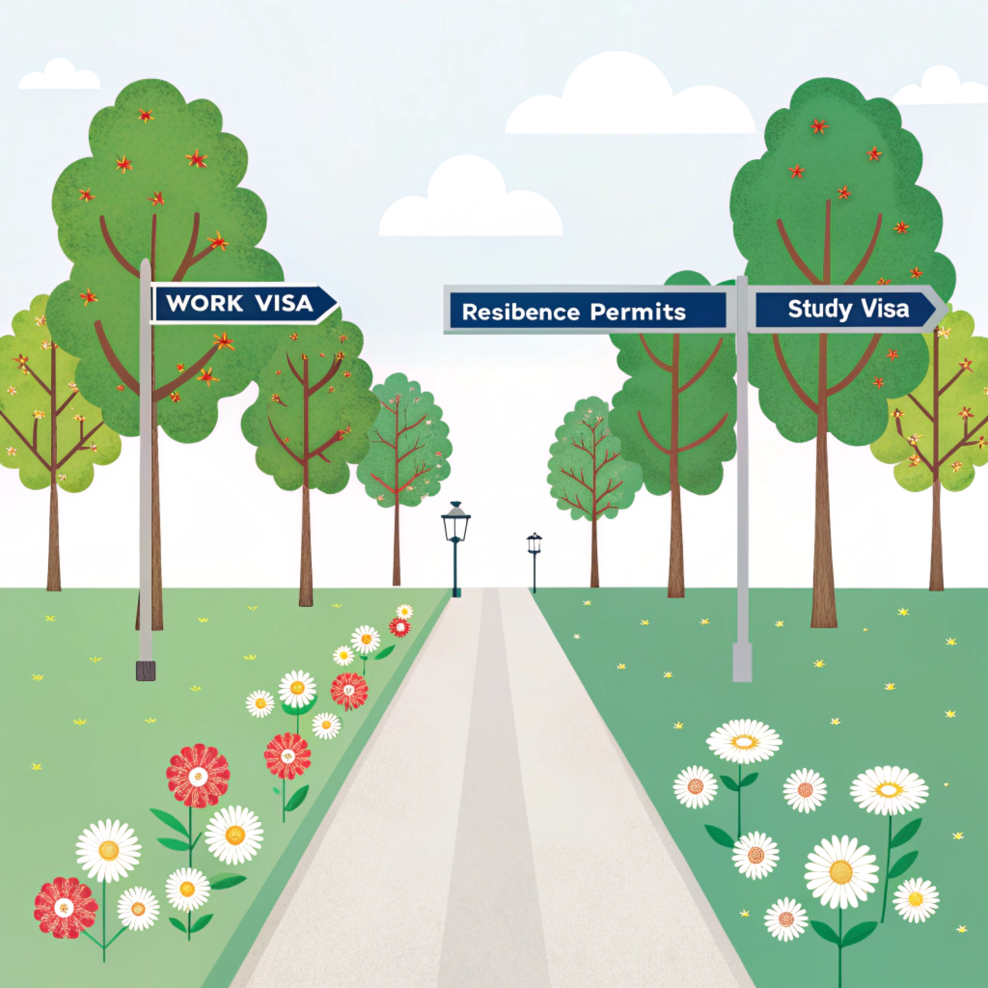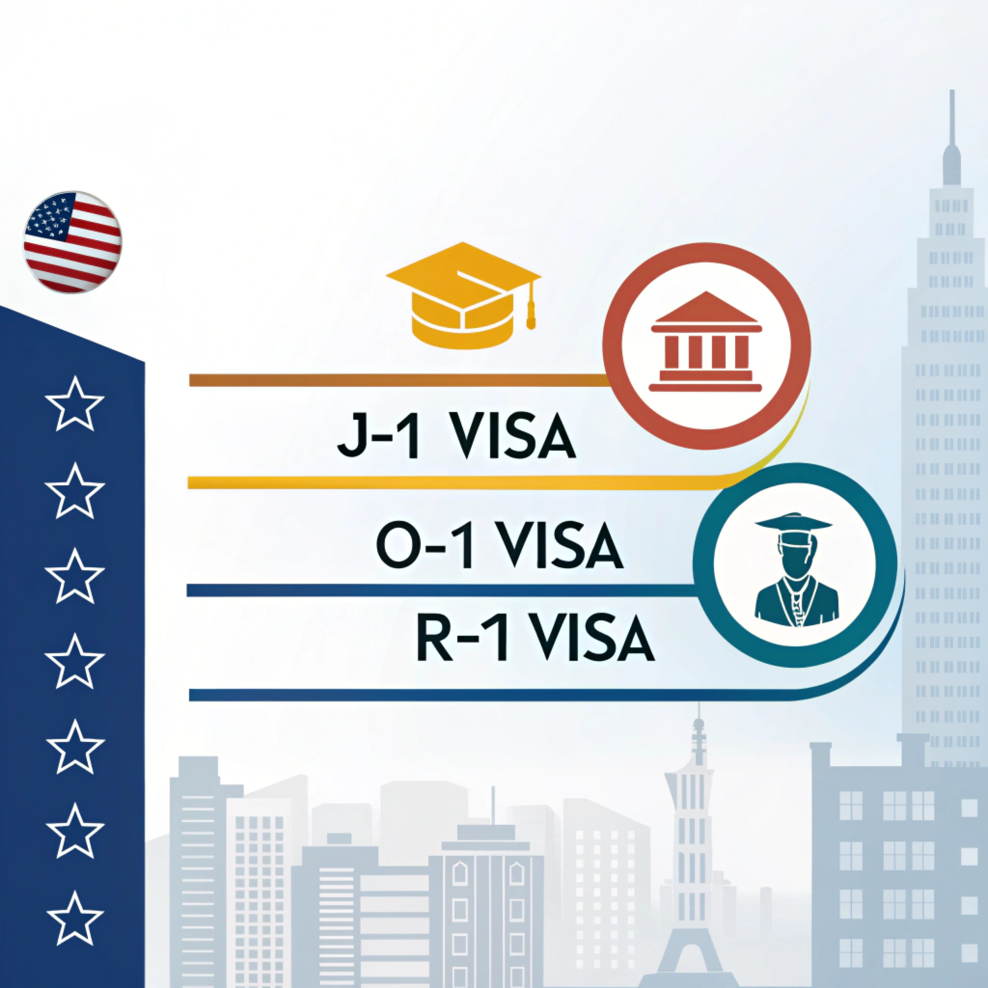
For European graduates seeking to extend their stay in the United States after completing their studies, understanding visa options is a critical step. The U.S. visa system offers a variety of pathways tailored to different career goals, industries, and personal circumstances. For those interested in learning more about how to navigate this process and the job market, our article on Finding a Job in the USA as a European Graduate provides valuable insights. This guide also offers a detailed breakdown of the available visa options, with specific emphasis on opportunities and challenges faced by European nationals.
Visa Requirements for European Graduates

The process of obtaining a U.S. visa as a European graduate involves navigating strict legal guidelines, fluctuating policies, and competitive application systems. While the opportunities are immense, knowing the specific visa types and their requirements is essential to crafting a successful post-graduation strategy.
Why European Graduates Have Unique Advantages
European graduates often have specific advantages compared to applicants from other regions:
- Treaty-Based Visas: Many European countries maintain bilateral trade and investment agreements with the U.S., facilitating visas such as the E-1 and E-2.
- Cultural and Diplomatic Relations: Shared cultural values and strong diplomatic ties between Europe and the U.S. can positively influence eligibility for certain programs.
- Global Recognition of European Degrees: European academic credentials are widely respected, often fulfilling the educational prerequisites for visas like H-1B or EB-2.
For example, graduates from STEM fields in Europe are particularly competitive due to their high demand in the U.S. labor market.

Beyond academic credentials, European graduates should also emphasize their work experience and internships. Many U.S. employers highly value hands-on experience, especially for STEM graduates. Securing a strong recommendation letter from a reputable institution or company can significantly strengthen an application. Additionally, it’s essential to be aware of the specific visa requirements for each country, as bilateral agreements may vary, influencing the type of visa and the process involved.
Common Challenges for European Graduates
Despite these advantages, challenges exist:
- Strict Quotas: Popular visas like the H-1B are subject to annual caps, making the process competitive.
- Sponsorship Dependence: Many visas require U.S. employers to sponsor applicants, which can limit opportunities.
- Compliance with Tight Timelines: Transitioning from student visas (F1) to work visas often demands timely and well-prepared applications.
Being proactive, organized, and informed is crucial to overcoming these obstacles.
Visa Pathways for European Graduates

A variety of visa options are available for European graduates, catering to different career paths and objectives. Below are the most relevant options.
1. Practical Training on an F1 Visa
The F1 visa is the most common visa for international students in the U.S. Upon graduation, it offers opportunities for practical work experience through Optional Practical Training (OPT) or Curricular Practical Training (CPT).
What is OPT?
OPT is a temporary employment authorization for international students. It allows them to gain hands-on work experience in their field of study for up to 12 months post-graduation. For graduates in STEM (Science, Technology, Engineering, and Mathematics) fields, a 24-month extension is available, bringing the total OPT period to 36 months.
How to Apply for OPT:
- Discuss eligibility with your university’s international student office.
- Submit Form I-765 (Application for Employment Authorization) to USCIS.
- Provide evidence that the job aligns with your degree.
What is CPT?
CPT is a work authorization option available during your studies, enabling internships or employment tied directly to your academic curriculum.
Advantages for European Graduates:
- Opportunity to build professional connections in the U.S.
- Extended time in the U.S. for STEM graduates under the OPT extension program.
Key Considerations:
OPT is temporary. Graduates wishing to stay beyond this period must transition to a different visa type, such as the H-1B.
2. H-1B Visa (Specialty Occupation)
The H-1B visa is one of the most sought-after options for European graduates. It enables foreign nationals to work in roles requiring specialized knowledge and a bachelor’s degree or higher.
Eligibility Requirements:
- A U.S.-based employer must sponsor your application.
- The job must be directly related to your academic background.
- You must hold at least a bachelor’s degree in your field.
Application Process:
- Obtain a Labor Condition Application (LCA) certification from the Department of Labor.
- File the H-1B petition with USCIS.
- Enter the annual H-1B lottery system if your application falls under the cap.
Benefits for European Nationals:
European graduates with specialized degrees often find U.S. employers eager to sponsor them, particularly in sectors like IT, engineering, healthcare, and finance.
Limitations:
- Annual quotas (65,000 for regular applicants and 20,000 for those with U.S. advanced degrees).
- Limited mobility, as H-1B ties you to the sponsoring employer.
3. E-2 Visa (Treaty Investor)
The E-2 visa is designed for nationals of countries with investment treaties with the U.S., which includes most European nations.
Eligibility Requirements:
- You must make a “substantial investment” in a U.S.-based business.
- Demonstrate that the business will generate income beyond providing for you and your family.
Why E-2 is Ideal for European Graduates:
- Many European graduates with entrepreneurial aspirations leverage this visa to establish startups or invest in existing enterprises.
- Unlike H-1B, there is no cap or lottery system.
Challenges:
- The investment must be significant and at risk of loss.
- The visa does not provide a direct pathway to permanent residency.
4. H-3 Visa (Trainee)
The H-3 visa is a short-term option for individuals seeking training in a specific field unavailable in their home country.
Ideal for European Graduates:
- Graduates aiming to acquire specialized skills in the U.S. for future use in Europe.
- Useful for industries such as healthcare, manufacturing, and technology.
Key Details:
- Valid for up to 2 years.
- Training cannot be for general employment purposes.
5. L-1 Visa (Intracompany Transfer)
For European graduates employed by multinational corporations, the L-1 visa offers a pathway to transfer to U.S. offices.
Eligibility Requirements:
- Employment with the overseas company for at least one year.
- Transfer must be for managerial, executive, or specialized roles.
Advantages:
- Possible pathway to permanent residency under the EB-1 category.
- No annual caps or lottery requirements.
Challenges:
- Requires significant documentation to prove the relationship between the U.S. and overseas offices.
6. Employment-Based Green Cards
European graduates interested in permanent residency can explore employment-based green cards under the following categories:
- EB-1 – For individuals with extraordinary abilities, outstanding researchers, or multinational executives.
- EB-2 – For those with advanced degrees or exceptional abilities, particularly in fields of national interest.
- EB-3 – For skilled workers, professionals, and unskilled workers in roles requiring at least a bachelor’s degree.
The green card application process often involves securing a U.S. employer to sponsor the petition and obtaining labor certification.
Alternative Options for European Graduates

1. J-1 Visa for Cultural Exchange
The J-1 visa facilitates cultural exchange programs, internships, and research opportunities. European graduates can use this visa to gain professional experience before returning to their home country.
2. O-1 Visa (Extraordinary Ability)
Graduates with exceptional achievements in academia, arts, sciences, or business may qualify for the O-1 visa, which provides a route to live and work in the U.S.
3. R-1 Visa (Religious Workers)
For those involved in religious vocations, the R-1 visa offers an opportunity to work in U.S.-based religious organizations.
How to Navigate the Visa Application Process
- Start Early: Research visa options and begin preparing at least a year before graduation.
- Seek Professional Guidance: Consult immigration attorneys or university advisors to streamline your application.
- Leverage University Resources: Most institutions offer support through dedicated international offices.
Conclusion
For European graduates, the United States presents a wealth of opportunities to gain professional experience, advance careers, and explore entrepreneurial ventures. By understanding the available visa pathways, leveraging existing advantages, and navigating the application process strategically, you can successfully achieve your post-graduation goals. Whether you aim to work in a specialized field, establish a business, or secure permanent residency, the U.S. offers a clear path for ambitious European graduates.



